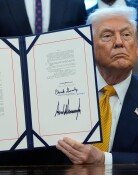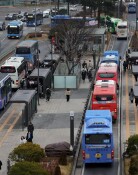Strong Korea-U.S. Alliance Guarantees Koreas Freedom
Strong Korea-U.S. Alliance Guarantees Koreas Freedom
Posted May. 06, 2005 07:49,
Evans J.R. Revere, the principal deputy assistant secretary of state for East Asian and Pacific affairs, emphasized that the biggest challenge for the Korea-U.S. alliance is how to handle North Korea and its nuclear issue.
At the closed meeting on May 2, hosted by the Korea Economic Institute (KEI) in Washington D.C., Principal Deputy Assistant Secretary Revere stated the concerns and interests of the U.S. in regard to the Korea-U.S. alliance, the U.S.s strategic flexibility, and Koreas role as a balancer of peace in Northeast Asia.
The U.S. Department of State released Reveres speech on its homepage (www.state.gov) on May 4.
In particular, regarding the issue of the U.S.s strategic flexibility, on which Korea and the U.S. disagree, Principal Deputy Assistant Secretary Revere noted that such flexibility is not a one-way street only for the U.S., and but a principle that adheres to the U.S.s promise to defend Korea by allowing us to dispatch U.S. troops for emergencies on the Korea Peninsula no matter where the troops are stationed.
Regarding President Roh Moo-hyuns assertion to act as a balancer in Northeast Asia, Revere showed his understanding by saying that it is Koreas goal not to repeat its fate over the last 100 years, and that in another respect, it reflects Koreas ambition to play a bigger role in the Northeast Asia region and, further, in the international arena.
However, Revere pointed out that although he understands that tragic history and painful past experiences sometimes impose a heavy burden on the Koreans, Korea is now strongly allied with the U.S., which guarantees Koreas independence and freedom.
Principal Deputy Assistant Secretary Revere said that the U.S. understands Koreans particular anxiety about North Korea, and that South Koreas view of the North is a product that complexly combines a sense of national solidarity with the people of the North, the fear of the Norths military forces, and the desire to avoid instability on the Korean Peninsula.
Soon-Taek Kwon maypole@donga.com







